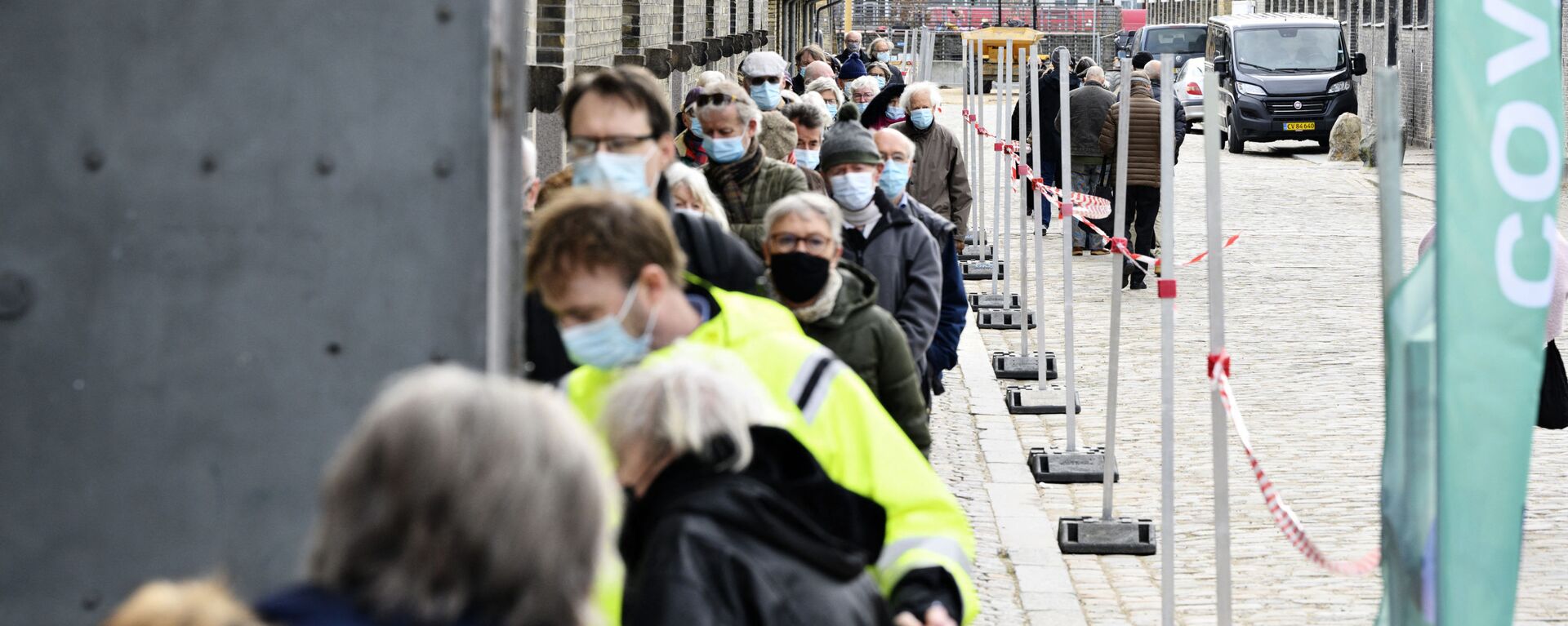https://sputnikglobe.com/20210916/fourth-or-fifth-covid-19-wave-likely-danish-strategists-warn-1089118959.html
Fourth or Fifth COVID-19 Wave 'Likely', Danish Strategists Warn
Fourth or Fifth COVID-19 Wave 'Likely', Danish Strategists Warn
Sputnik International
Despite Denmark recently becoming the first European country to ditch all coronavirus restrictions and declaring the pandemic "under control", citing a high... 16.09.2021, Sputnik International
2021-09-16T07:24+0000
2021-09-16T07:24+0000
2021-09-16T07:24+0000
denmark
newsfeed
europe
coronavirus
covid-19
https://cdn1.img.sputnikglobe.com/img/07e5/06/1d/1083264831_0:355:2383:1695_1920x0_80_0_0_1756d8e22179baca0b180f1aab8a9ed8.jpg
In spite of Denmark's recent reopening, the country's new COVID-19 strategy has been marked by uncertainty, as a fourth and even fifth wave of the disease has been deemed "likely".A recent report by a panel of Danish government experts and medical professionals titled "Everyday life with increased preparedness" has advised the government to stay put and be ready to reintroduce drastic measures against COVID-19, should the situation deteriorate.The 80-point report recommended a two-pronged contingency strategy. One aspect is the so-called "basic level of COVID management", which balances between considerations of epidemic control, society, economy, well-being, public health, and freedom. The other aspect is about having a contingency plan that "supports a rapid escalation of efforts, in case the epidemic shifts to a more critical stage" amid "worrying virus variants that are emerging".Furthermore, Iversen warned of a growing pressure on hospitals this autumn, due to a weaker general immunity in the population as a result of lockdowns, which means that people appear to be more susceptible to respiratory infections."When we enter the dark and cold time, we start to stay indoors more, and then respiratory infections have a better opportunity to spread", Iversen pointed out, warning of a potentially serious flu epidemic.Last week, Denmark scrapped all coronavirus restrictions and declared the COVID-19 pandemic "under control", becoming the first European country to do so. More than 80 percent of Danes above the age of 12 are fully vaccinated.To date, the Scandinavian country has seen over 353,000 COVID-19 cases, with more than 2,600 deaths.
https://sputnikglobe.com/20210809/denmark-iceland-say-vaccination-has-not-led-to-herd-immunity-1083560293.html
denmark
Sputnik International
feedback@sputniknews.com
+74956456601
MIA „Rossiya Segodnya“
2021
News
en_EN
Sputnik International
feedback@sputniknews.com
+74956456601
MIA „Rossiya Segodnya“
Sputnik International
feedback@sputniknews.com
+74956456601
MIA „Rossiya Segodnya“
denmark, newsfeed, europe, coronavirus, covid-19
denmark, newsfeed, europe, coronavirus, covid-19
Fourth or Fifth COVID-19 Wave 'Likely', Danish Strategists Warn
Despite Denmark recently becoming the first European country to ditch all coronavirus restrictions and declaring the pandemic "under control", citing a high vaccination level, the nation's strategists recommend that the government prepare contingency measures amid "worrying virus variants".
In spite of Denmark's recent reopening, the country's new COVID-19 strategy has been marked by uncertainty, as a fourth and even fifth wave of the disease has been deemed "likely".
A recent report by a panel of Danish government experts and medical professionals titled "Everyday life with increased preparedness" has advised the government to stay put and be ready to reintroduce drastic measures against COVID-19, should the situation deteriorate.
"We are in a good situation right now, but we cannot say that it is finally over. There is still a risk of new mutations, and the global rollout of vaccines has long prospects", Torben Andersen, the chairman of the expert group, said as quoted by Danish Radio.
The 80-point report recommended a two-pronged contingency strategy. One aspect is the so-called "basic level of COVID management", which balances between considerations of epidemic control, society, economy, well-being, public health, and freedom. The other aspect is about having a contingency plan that "supports a rapid escalation of efforts, in case the epidemic shifts to a more critical stage" amid "worrying virus variants that are emerging".
"It is likely that we will see a fourth or fifth wave of corona because it runs out there globally", Astrid Iversen, professor of virology and immunology at the University of Oxford and one of the members of the expert panel, said.
Furthermore, Iversen warned of a growing pressure on hospitals this autumn, due to a weaker general immunity in the population as a result of lockdowns, which means that people appear to be more susceptible to respiratory infections.
"When we enter the dark and cold time, we start to stay indoors more, and then respiratory infections have a better opportunity to spread", Iversen pointed out, warning of a potentially serious flu epidemic.
Last week, Denmark scrapped all coronavirus restrictions and declared the COVID-19 pandemic "under control", becoming the first European country to do so. More than 80 percent of Danes above the age of 12 are fully vaccinated.
To date, the Scandinavian country has seen over 353,000 COVID-19 cases, with more than 2,600 deaths.


